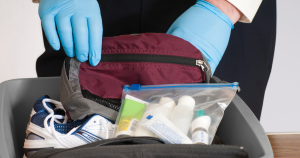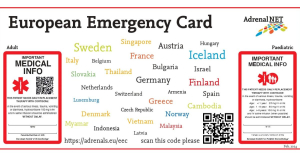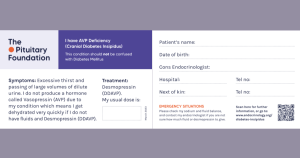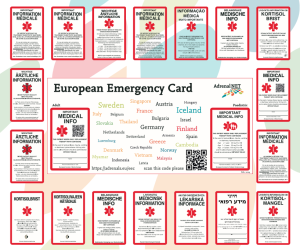Top Tips for Travelling with a Pituitary Disorder
With the summer months fast approaching, many of us are starting to think about travel plans. Whether it’s a quick weekend getaway or a longer vacation abroad, exploring new destinations can be an exciting and enriching experience. However, many individuals with a pituitary disorder often limit or avoid travelling after receiving their diagnosis as they feel overwhelmed by the challenges and uncertainties that traveling may entail. This is unfortunate, as travelling with a pituitary disorder is still possible with a little more planning, flexibility and organization.
In this month’s WAPO Blog we will share our top tips for travelling with a pituitary disorder so that you can minimize the stress and maximize the fun on your next vacation.

Choose your destination carefully and prepare yourself for travel
When planning the perfect trip, there are several things to keep in mind. Let’s start with the basics.
First, make sure that the destination and itinerary are adapted to your needs. This includes choosing the best suited mode of transportation.
If travelling by air or train, ensure that you select layovers and connections with sufficient connection times.
Similarly, if you are driving to your destination, make sure to plan breaks (for the bathroom, food/drinks, stretching or resting) into your itinerary and avoid travelling during rush hour to reduce stress. Ideally, it is best to travel with a companion so that the driving responsibility can be shared.
If traveling with friends or family, make sure that they are aware of your pituitary disorder. This will allow you to feel more comfortable about expressing your needs and they can be aware of any symptoms that could indicate an emergency situation and how best to support you.
Do not pack too many sightseeing activities into the same day and schedule time each day where you can take a break at your accommodation, if needed
If you’re traveling abroad, ensure you obtain travel insurance to cover any potential medical expenses in the destination country, should the need arise.
If you’re traveling across several time zones, make sure that you have a plan to adjust your medication schedule in order to avoid missed doses (or having to wake up in the middle of the night to take them). This can be discussed with your endocrinologist, endocrine nurse or general practitioner before leaving.
If you take medication that requires refrigeration, such as growth hormone for growth hormone deficiency, check with your accommodation in advance to ensure that your room is equipped with a mini fridge. When traveling, you can transport them in a small cooler bag. You can also call the transportation company (plane, train or cruise) to notify them of your condition and any needs you may have when booking.
You may also want to search for medical centers familiar with your pituitary disorder in the city where you are going, in case you need medical assistance while you are away from home. For a list of expert centers in Europe that specialize in endocrine diseases, you can take a look on the Orphanet website or check out the list of reference centers of ENDO-ERN.
Contacting a patient organization for your pituitary condition in the country you are visiting may also be a good idea as they may be able to answer more country-specific questions. WAPO’s list of member organizations is a good place to start.

Collect all important documents and medications/medical supplies before leaving
Before packing your bags, make sure to book an appointment with your general practitioner/endocrinologist/endocrine nurse. They will check your health status and you can discuss your trip and any medical essentials you may need, such as:
- Prescriptions for any medications you take, plus several weeks of extra doses in case of travel delays or other unforeseen events. Patients with adrenal insufficiency should also remember to bring an emergency hydrocortisone injection kit and have it with them at all times. If possible, bring 2 sets of kits: one kept in your carry-on and one in the carry-on of your travel companion (in case of theft).
- A medication passport and/or letter written by your doctor that explains your condition and the medications you need to take. This is important when going through security with medication or syringes, or in case you need to visit a healthcare professional during your visit. WAPO has International travel letters, available in various languages, which can be downloaded and completed by your doctor.
- An emergency card (preferably in the local language) is another document that can be useful to have with you when travelling in case of a medical emergency.
- For patients with adrenal insufficiency, you can find emergency cards in various languages from adrenals.eu/AdrenalNET, which can notify medics of the symptoms of an adrenal crisis and the need for hydrocortisone. They have equally produced Guidelines on taking hydrocortisone in times of stress to prevent an adrenal crisis.

- The Pituitary Foundation also has an Arginine Vasopressin (AVP) Deficiency awareness card to download.

- A medical alert bracelet can be worn if you have one.
- For patients with adrenal insufficiency, you can find emergency cards in various languages from adrenals.eu/AdrenalNET, which can notify medics of the symptoms of an adrenal crisis and the need for hydrocortisone. They have equally produced Guidelines on taking hydrocortisone in times of stress to prevent an adrenal crisis.
Another good idea is to bring important emergency contact information with you, such as:
- The contact information of your emergency contact person (a friend or family member that you would like to be contacted, in case of emergency).
- The contact information of your travel insurance provider, in case you are hospitalized or require medical attention.
- The contact information for your endocrine team in your home country, in case of need.
Finally, visit the Hidden Disabilities Sunflower Network’s website and grab yourself a sunflower lanyard!
Many patients with pituitary disorders have hidden disabilities, meaning that their condition is not visible. This can lead to a lack of support and understanding in certain everyday situations. The Hidden Disabilities Sunflower network was created in order to give people with invisible disabilities a simple way to signal that they may need additional support or patience. There are now businesses from various industries (travel, tourism and retail, among others) all around the world that have joined the Global Sunflower Network and are therefore informed about invisible disabilities and ready to assist anyone in need. For example, you can access a list of airports (and airlines) that are members to see if they are part of the network.

Manage your health and wellbeing during transit
As mentioned above, keep all medication in its original packaging and have it with you (in your carry-on luggage during flights) so that it is easily accessible during transit.
Notify all transportation services of any special accommodations you may need. For long-haul flights, you may wish to ask the cabin crew on your flight to refrigerate your medication for you. For patients with an AVP deficiency, you can let them know that you will need access to water and to the bathroom on a regular basis so that they are aware of this during the flight.
Once on your train/plane, try to relax and rest. Meditation, grounding techniques or listening to calming music can help if you have any anxiety. Stay hydrated during long train/plane rides and make sure to get up and move your legs. You may also wish to bring your own snacks so that you have them available when you need them. Other comfort items such as noise cancelling headphones or a comfortable travel pillow may also help you have a more pleasant experience.
When travelling by car, stay hydrated, maintain a comfortable temperature in the vehicle and take regular breaks along the way.

Once arrived, take time to adjust, keep your schedule flexible and enjoy!
If you have travelled across several time zones, be mindful of jetlag and allow yourself time to adjust to the new time zone and climate (e.g. warmer weather). As many pituitary disorders are also accompanied by fatigue, make sure to allow yourself ample time to rest and take breaks when needed.
Feel free to modify your plans on a daily basis, depending on your energy levels and how you feel. Make sure to monitor your symptoms, as any exacerbations could indicate that you need to adjust the dosage of your medication. At the end of the day, your health comes first and a holiday is supposed to be a relaxing experience, so know your limits and avoid unnecessary stress as much as possible.
Finally, remember to enjoy your experience! Soak up your surroundings, take pictures and, if you like, tag WAPO on social media to let us where in the world you have travelled to.
In conclusion, while travelling with a pituitary disorder may present some unique challenges, it should not deter anyone from exploring the world and enjoying new experiences. We hope that these tips will help you feel more confident the next time you travel. By preparing for your trip in advance, you will be able to focus on what’s really important: making unforgettable memories.

Additional resources:
WAPO’s International Travel Letters:
https://www.wapo.org/international-travel-letters/
AdrenalNET Adrenal insufficiency emergency cards:
https://adrenals.eu/emergency-card/international-emergency-cards/
AdrenalNET Guidelines on taking hydrocortisone to prevent an adrenal crisis: https://adrenals.eu/stress-help/
The Pituitary Foundation UK’s AVP Deficiency (Diabetes Insipidus) Awareness Card: https://www.pituitary.org.uk/product/avp-deficiency-diabetes-insipidus-awareness-card/
Hidden disability website: https://hdsunflower.com/
Register for CamRARE’s new Patient Passport (for rare diseases): https://www.camraredisease.org/rare-patient-passport/



